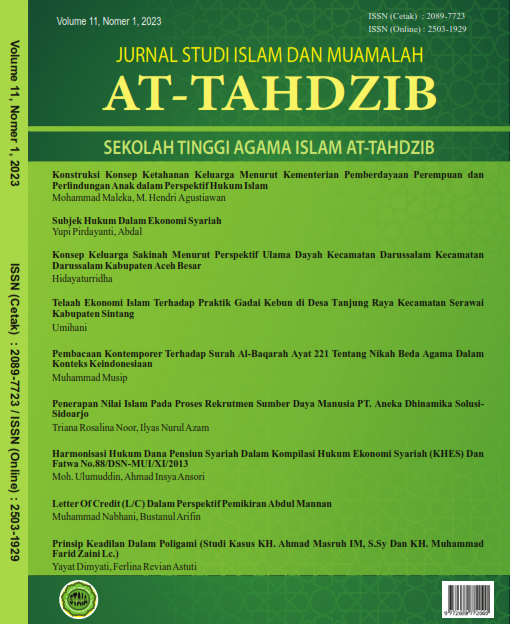Letter Of Credit (L/C) Dalam Perspektif Pemikiran Abdul Mannan
Abstrak
Background. Given the existence of legal provisions regarding the implementation of L/C transactions, it is hoped that L/C will run smoother and increase so that it has a positive impact on the growth of international trade. PBI L/C provisions are made in line with UCP 500 provisions and international L/C law so that the material for PBI L/C is on an international scale. PBI L/C will not hamper L/C practices that have been carried out by banks and the business world so far. PBI L/C actually legally covers the practice of L/C.
Aim. From the presentation of the above, it will give rise to a number of problems that need to be solved. First: what is the perspective of Islamic law regarding the implementation of L/C based on the concept of Sharia? .Second: how does Abdul Mannan give his theoretical concept of the existence of L/C which is a service product in Sharia banking? This problem requires solving through a historical-philosophical approach.
Methods. In this study, the authors used a qualitative approach in research procedures to produce holistic-descriptive data from the observed phenomena. The reason for choosing this qualitative method is to obtain a comprehensive description related to perceptions, actions, normative legal force and Islamic law which enforces L/C as a means of international payment that has developed to date.
Results. L/C syari'ah plays an important role in the international payment system when compared to other payment systems. The existence of the application of shari'ah contracts included in the implementation of the shari'ah L/C implies the importance of the position of shari'ah L/C compared to conventional L/C. Thus, even though Mannan's opinion has not been fully implemented in Indonesia, Mannan's thoughts can be used as a comparative study against other models of economic systems.
Referensi
Abdul Hamid Abu Sulaiman, “ Islamization of Knoledge with Special Reference to Political Scienceâ€, dalam American Journal of Islamic Social Science, Vol. 2 No. 2, 1985, h. 263
Abdul Mannan, Teori dan Praktek Ekonomi Islam, (Yogyakarta: Dana Bakti Prima Yasa, 1997), hlm. 19
Abdul Mughits, Epistemologi Ilmu Ekonomi Islam ( Kajian atas Pemikiran M. Abdul Mannan dalam Teori dan Praktek Ekonomi Islam), h.185
Achmad Wardi Muslich, Fiqh Muamalat (Jakarta: Sinar Grafika Offset,2010), Cet.I, h.600
Agoes Moerjono, Melangkah Menuju Ekspor: Suatu Petunjuk Praktis (Jakarta: Institut Bankir Indonesia, 1995), h.238
Agus Martowardojo, BI Sebut Aturan LC Bikin Data Ekspor Lebih Akurat diakses pada 24 November 2015 dari http://bisnis.liputan6.com/read/2161115/bi-sebut-aturan-lc-bikin-data-ekspor-lebih-akurat
Alamsyah, Eksistensi Letter of Credit Syari’ah dan Permasalahan Hukumnya (T. Tp: T. pn, tt.), h. 8
Al-Syafi’i, al-Risalah (Beirut: al-Maktabah al-‘ilmiah, t.th),(tahqiq:Ahmad Muhammad Syakir), h.477
Andrian Sutedi, Hukum Ekspor Impor (RAS 2014)H.63 Lihat pula English Business Correspondence,(Yogyakarta: Kanisius,2006), h. 81
Ascarya, Akad dan Produk Bank Syari’ah: Konsep dan Praktek di Beberapa Negara....h. 1
Boris Kozolchyk,â€The Emerging Law of Standby Letter of Credit and Bank Guaranteeâ€â€™ 24 Arizona Law Review, 1982, h. 319
Brooke Wunnicke, Stanby Letter of Credit ( T.tp: T.pn, 1989), h.1 disadur dari Ramlan Ginting, Letter of Credit Tinjauan Aspek Hukum dan Bisnis.............h.
Darwin, Pemikiran M.A Mannan tentang Ekonomi Islam (T.tp:T.pn, 2012), h. 16
Emmy Pangaribuan Simanjutak, Pembukuan Kredit Berdokumen (Documentary Credit Opening)(T,tp:T,pn ,1979), h. 16
Fahrur Ulum, “Telaah Kritis atas Pemikiran Ekonomi Islam Abdul Mannan†, Jurnal Al-Qanun, Vol. XXII, No. 2 (2009), h. 451
http://www.hukumonline.com/berita/baca/lt551cf0e82975a/mendag-terbitkan-aturan-ketentuan-penggunaan-l-c-ekspor-barang-tertentu diakses pada 2 Desember 2015
Imamudin Yuliadi, Ekonomi Islam Sebuah Pengantar, (Yogyakarta: LPPI, 2001), h.53.
Louay Safi, The Foundation of Knowledge : a C omparative Study in Islamic and Western Methods of Linguiry (Malaysia: IIUM, 1996), h. 15
Moh Shofan, Jalan Ketiga Pemikiran Islam (T.tp: IRCiSoD bekerjasama dengan Universitas Muhammadiyah Gresik, 2006),h. 377
Muhammad Abdul Mannan, Institutional Setting of Islamic Economic Order : A Comparative analysis of economic processes ( T.Tp: King Abdulaziz University Press, 1981), h. 15-17
Muhammad Musa al- Tiwana, al-Ijtihad wa Mada Hajatina ilaih fi Haza Al’ ashr (T.tp: Dar al-Kutub al-Hadisah), h. 39 dalam Suyatno, Dasar-Dasar Ilmu Fiqh & Ushul Fiqh ( Yogyakarta :Ar-Ruzz Media, 2011), h. 178
Surat Edaran Bank Indnesia No. 26/34/ULN tanggal 17 Desember 1993 tentang Uniform CustomsAnd Practice For Documentary Credits
Undang-undang Nomor 10 Tahun 1998 tentang Perbankkan dan Bank Indonesia
Wahbah al-Zuhaili, Ushul al-Fiqh al-Islami (Beirut: Dar al-Fikri,1986), Juz I, H. 603
Wahbah Azzuhaili, Al Fiqh Al Islamy Wa Adillatuh (Beirut: Darul Fikr,1997), h.668, Cet. IV, Juz 4
Wiliam James Earle, Introduction to Philosophy dalam Fahrur Ulum, Telaah Kritis atas Pemikiran Ekonomi Islam Abdul Mannan, Jurnal al-Qanun, Vol.XXII, No.2(2009).
##submission.copyrightStatement##
##submission.license.cc.by4.footer##
Jurnal Studi Islam by At-Tahdzib is licensed under a Creative Commons Attribution 4.0 International License.
Based on a work at http://ejournal.kopertais4.or.id/index.php/tahdzib/index





